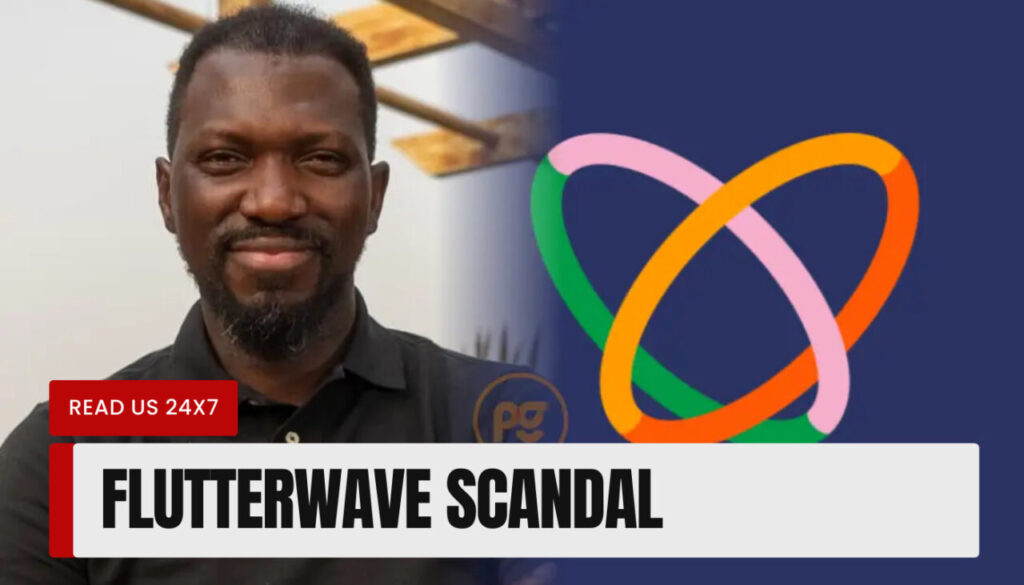Flutterwave, Africa’s most valuable fintech startup, is facing a series of allegations that could jeopardize its reputation, business, and IPO plans. The company and its CEO, Olugbenga Agboola, have been accused of financial misconduct, bullying and mismanagement, administrative errors, and false ownership claims by former employees and journalists. How did Flutterwave get into this mess, and can it recover from the damage? This article will explore the allegations, the impact, the responses, and the future of Flutterwave.
Allegations Against Flutterwave and Its CEO
Flutterwave is a payment platform that enables businesses to accept payments from multiple sources across Africa and beyond. Founded in 2016 by Agboola and Iyinoluwa Aboyeji, Flutterwave has raised over $300 million in funding and reached a valuation of $3 billion in 2021. However, the company’s success has been overshadowed by several allegations that have emerged in 2022.

Financial misconduct
One of the allegations is that Flutterwave and Agboola engaged in financial misconduct, including money laundering, insider trading, and stock manipulation. In July 2022, a Kenyan High Court froze accounts held by Flutterwave holding over 6.2 billion of Kenyan shilling based upon allegations that the funds were the proceeds of credit card fraud and money laundering after a request from Kenya’s Assets Recovery Agency. The company has denied accusations of financial misconduct.
Another allegation is that Agboola created a phantom ‘co-founder’ identity to give himself more shares in the company’s early days, and offered share prices below the company’s valuation to employees who wanted to cash in on their vested options. These employee stock sales, the story alleged, went to an investment vehicle Agboola controlled. A former employee, Gbemisola Ajayi, is suing Flutterwave for breach of contract and fraud over her stock options.
Bullying and mismanagement
Another allegation is that Flutterwave and Agboola fostered a culture of bullying and mismanagement within the company. Bloomberg interviewed at least three former Flutterwave employees who said a culture of harassment and bullying from executives had developed under Agboola. The people asked not to be identified for fear of reprisals.
One of the former employees who spoke out publicly is Clara Wanjiku Odero, who accused Agboola of bullying and the company of negligence leading to fraud. Odero, now the CEO of a Softbank-backed Kenyan fintech Credrails, said she was fired from Flutterwave after reporting a case of fraud involving a senior executive. She also claimed that Agboola had inappropriate relationships with subordinate female staff members at Flutterwave.
Administrative errors
Another allegation is that Flutterwave and Agboola made administrative errors that created serious legal problems for former staff. According to West Africa Weekly , a Substack newsletter by David Hundeyin, a Nigerian journalist, Flutterwave failed to file proper documentation with the Securities and Exchange Commission (SEC) in Nigeria and the United States for its stock awards to employees. This meant that former employees who left the company could not sell their shares or exercise their options without facing legal consequences.
Hundeyin also alleged that Agboola did not disclose to Access Bank, his last employer before founding Flutterwave, that he was simultaneously working for them while building Flutterwave in the latter’s early days. This could amount to conflict of interest and breach of contract.
False ownership claims
Another allegation is that Flutterwave and Agboola made false claims about their ownership and origin. Hundeyin claimed that Agboola lied about being a co-founder of Flutterwave with Aboyeji, who left the company in 2018. He said that Agboola was hired as a chief technology officer by Aboyeji, who was the sole founder of Flutterwave. He also said that Flutterwave was not an original idea by Agboola or Aboyeji, but a spin-off from another fintech startup called Paystack , which was acquired by Stripe in 2020 for $200 million.
Impact on Flutterwave and Its IPO Plans
The allegations against Flutterwave and Agboola have had a negative impact on the company’s reputation, business, and IPO plans. The company has faced backlash from customers, partners, regulators, investors, and the public over its alleged practices.
Damage to reputation
Flutterwave’s reputation as Africa’s fintech champion has been tarnished by the allegations. The company has been criticized for its lack of transparency, accountability, and ethics. The allegations have also cast doubt on the company’s achievements and growth figures. Some observers have questioned whether Flutterwave’s valuation of $3 billion is justified or inflated.
Legal repercussions
Flutterwave’s legal troubles have increased as a result of the allegations. The company has been sued by former employees and investigated by authorities in Kenya and Nigeria. The company could face fines, sanctions, or even criminal charges if found guilty of any wrongdoing. The company could also lose its licenses or permits to operate in some markets, such as Kenya, where it has been accused of money laundering.
Loss of investor trust
Flutterwave’s investor trust has been eroded by the allegations. The company has received funding from prominent investors such as Tiger Global, Y Combinator, Greycroft, Visa, and Mastercard. However, these investors may reconsider their support for Flutterwave if the allegations are proven true or damage the company’s prospects. The company may also find it harder to raise more capital or attract new investors in the future.
Responses and Repercussions
Flutterwave and Agboola have responded to the allegations by denying them and taking some actions. However, these responses have not been sufficient to address the concerns or resolve the issues.
Denial of allegations
Flutterwave and Agboola have denied the allegations of financial misconduct, bullying and mismanagement, administrative errors, and false ownership claims. The company issued a statement in August 2022 saying that it has “always operated with the highest levels of integrity and transparency” and that it has “never engaged in any form of financial impropriety”. The company also said that it has taken action against those found culpable for any form of harassment in the company.
Agboola also addressed the allegations in an email to employees in April 2022, saying that they were “false and malicious” and that he was “deeply hurt” by them. He said that he was a co-founder of Flutterwave with Aboyeji and that he did not create a phantom identity to get more shares. He also said that he did not engage in insider trading or stock manipulation and that he disclosed his involvement with Flutterwave to Access Bank.
Suspension of CEO
Flutterwave’s board of directors decided to suspend Agboola as CEO in September 2022, pending an internal investigation into the allegations. The board appointed Jimmy Ku, the chief operating officer, as interim CEO. The board said that it was committed to ensuring “the highest standards of corporate governance and ethical conduct” at Flutterwave.
Internal investigations
Flutterwave’s board of directors also launched internal investigations into the allegations in August 2022. The board hired external consultants to conduct independent audits and reviews of the company’s financial records, stock awards, compliance procedures, and internal policies. The board said that it would share the findings and recommendations of the investigations with all stakeholders once completed.
Potential impact on business partnerships
Flutterwave’s business partnerships could be affected by the allegations. The company has partnered with several global and local players in the payments industry, such as Stripe , PayPal , Google , Amazon , Uber , Spotify , Netflix , MTN , Safaricom , and others. These partners may reconsider their relationships with Flutterwave if they find the allegations credible or harmful to their own reputation or interests. Some partners may terminate their contracts or suspend their services with Flutterwave until the issues are resolved.
The Future of Flutterwave
Flutterwave’s future is uncertain amid the allegations. The company faces several challenges and risks that could hamper its growth and survival. However, the company also has some opportunities and strengths that could help it overcome the crisis and recover.
Possibility of recovery
Flutterwave has a possibility of recovery if it can address the allegations effectively and convincingly. The company needs to demonstrate that it is transparent, accountable, and ethical in its operations and practices. The company needs to cooperate with the authorities and regulators in resolving any legal issues. The company needs to restore trust and confidence among its customers, partners, investors, and employees. The company needs to implement reforms and improvements in its governance, management, culture, and compliance.
Need for transparency and accountability
Flutterwave needs to be more transparent and accountable in its dealings with all stakeholders. The company needs to disclose more information about its financial performance, valuation, ownership structure, stock awards, compliance status, and business partnerships. The company needs to provide clear and consistent explanations for any discrepancies or irregularities in its records or reports. The company needs to admit any mistakes or wrongdoing and take responsibility for them.
Impact on African fintech industry
Flutterwave’s crisis could have an impact on the African fintech industry as a whole. Flutterwave is one of the leading players in the industry, which has seen rapid growth and innovation in recent years. Flutterwave’s success has inspired many other fintech startups and entrepreneurs across Africa. Flutterwave’s crisis could affect the impact of the industry and the public perception of fintech in Africa. Flutterwave’s crisis could also create opportunities for other fintech players to fill the gap or challenge Flutterwave’s position in the market. Flutterwave’s crisis could also prompt more scrutiny and regulation of the fintech sector by the authorities and policymakers in Africa.
Conclusion
Flutterwave’s debacle is a serious setback for the company and a shock for the African fintech industry. The company is facing multiple allegations that could damage its reputation, business, and IPO plans. The company has denied the allegations and taken some actions, but these have not been enough to clear its name or resolve its problems. The company needs to be more transparent and accountable in its dealings with all stakeholders. The company also needs to implement reforms and improvements in its governance, management, culture, and compliance. The company has a possibility of recovery if it can address the allegations effectively and convincingly. The company also has some opportunities and strengths that could help it overcome the crisis and recover. The company’s future is uncertain, but not hopeless. Flutterwave’s debacle is a lesson for the African fintech industry and a test for its resilience and innovation.








